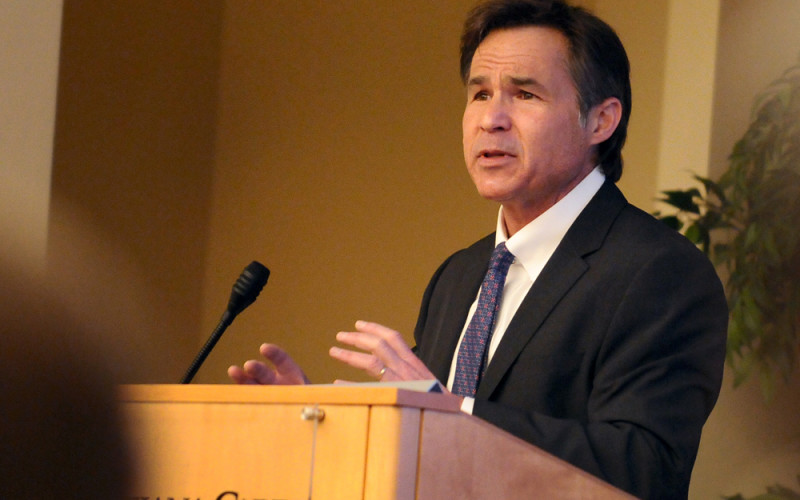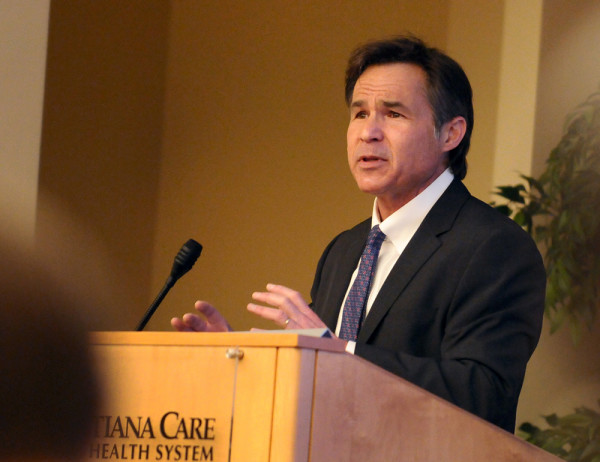Alzheimer’s experts convene in inaugural Swank Memory Care Center conference


With an estimated 16,000 Delawareans expected to be living with Alzheimer’s disease by 2025, Christiana Care’s Swank Memory Care Center held its first conference on March 20 to educate health care providers about Alzheimer’s and other neurological conditions that affect memory and reasoning.
Called “Managing Dementia: A Multispecialty Approach,” the conference drew more than 160 people to the John H. Ammon Medical Education Center at Christiana Hospital to hear from leaders in geriatrics, neurology and neuropsychiatry on diagnosing and assisting patients with multiple cognitive deficits associated with dementia.
“Our goal in all that we do is to offer ideas and practices that people find immediately helpful,” said David Simpson, M.D., medical director of the Swank Memory Care Center and a member of the conference planning committee.
The Swank Memory Care Center, at 205 W. 14th St. in Wilmington, is the first and only comprehensive outpatient memory center in Delaware. Established in 2011 with a $1.25 million grant from the Howard W. Swank, Alma K. Swank, and Richard Kemper Swank Foundation of Wilmington, the Swank Memory Care Center assists clinicians, patients and caregivers in managing all aspects of dementia.

As the conference began, Michael Rosenthal, M.D., chair of the Department of Family & Community Medicine, which oversees the center, thanked the Junior Board of Christiana Care for fundraising efforts on behalf of the center. A $72,000 gift from the Junior Board provides support for patients, families and caregivers, as well as community education for health care providers, which made the conference possible. Dementia education is a vital way for Christiana Care to partner with the community, Dr. Rosenthal said.
The conference was in keeping with a state of Delaware Alzheimer’s Disease plan, announced in February 2014 at the Swank Memory Care Center, calling for increased understanding and awareness about Alzheimer’s and related disorders, as well as focusing more attention on long-term care, better data collection and strengthening support for caregivers.
“One of the key features of Swank is that you get medical support along with psycho-social support,” said Patricia M. Curtin, M.D., FACP, CMD, chief of Geriatric Medicine and director of clinical strategy and community affairs at the Swank Memory Care Center. “We assist the patient with the disease, but many times there is a caregiver who takes care of their loved one 24/7. Our Swank team helps with counseling, support groups and connecting people to resources that can make caregiving a little easier.”
A multispecialty approach to dementia will become increasingly important as 50 percent of people who reach 85 are expected to develop Alzheimer’s disease. With this population, said Jeffrey M. Guarino, M.D., geriatrician at the Swank Memory Care Center, there is often an overuse of medications — a practice known as polypharmacy — and this should be avoided. Polypharmacy produces patient dissatisfaction, unwanted drug interactions, falls and hip fractures, and patient noncompliance in taking important medications, he said.
The speakers noted that there are no proven medications or nutritional supplements for slowing the development of Alzheimer’s. While antipsychotics have been used to manage aspects of psychosis and confusion, these medications carry warnings about increased risk of death and stroke, said Neal G. Ranen, M.D., geriatric neuropsychiatrist with Ranen Psychiatric Associates in York, Pa., and Baltimore, Md.
Lanny Edelsohn, M.D., FAAN, a neurologist with Christiana Care Neurology Specialists, shared a similar point of view. “We do need better medications,” said Dr. Edelsohn, who conducts clinical trials for promising new drugs. “Hopefully in the near future we will have a treatment that works.”
In the progression of Alzheimer’s, brain abnormalities appear to be caused by proteins that disrupt normal functioning. This leads to memory loss and disruptive behaviors — the most common being apathy, depression, agitation and aggression, followed by sleep disturbances, anxiety, delusion and hallucinations, said Dr. Ranen.
These behaviors present challenges to caregivers, but there are hopeful studies suggesting that when caregivers receive counseling they are more confident in their role and experience less depression, even when there is little positive change in a loved one, Dr. Ranen said.
Georgianna “George” Riley of Pike Creek, a member of the Junior Board of Christiana Care, agreed on the importance of finding emotional support and attended the conference because she is part of a network of caregivers for a family member with Alzheimer’s. “I feel that it is most important, personally and for all caregivers, to continue to learn all we can about the disease and the implications for care throughout this journey,” Riley said.
When she began caregiving, she heard about the Swank Memory Care Center and was pleased with all the support her family received there. Her goal now is to see that the center becomes better known. She is a member of a recently convened affinity group that will advocate for the center.
“Swank was a great starting point, giving us a diagnosis and helping us understand what type of care my mother-in-law would need,” said Riley. “With Alzheimer’s, if you know the facts, you are better equipped to deal with the realities of the disease and can more calmly cope with this labor of love.”